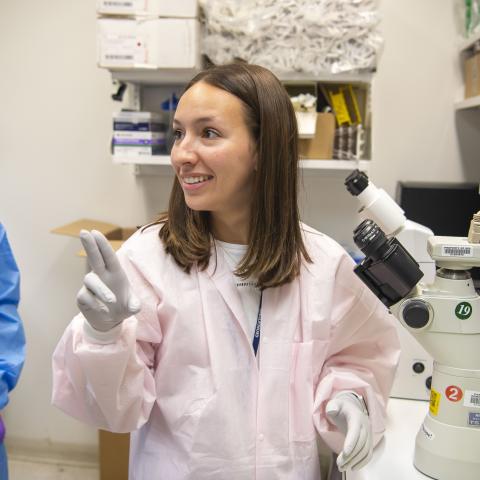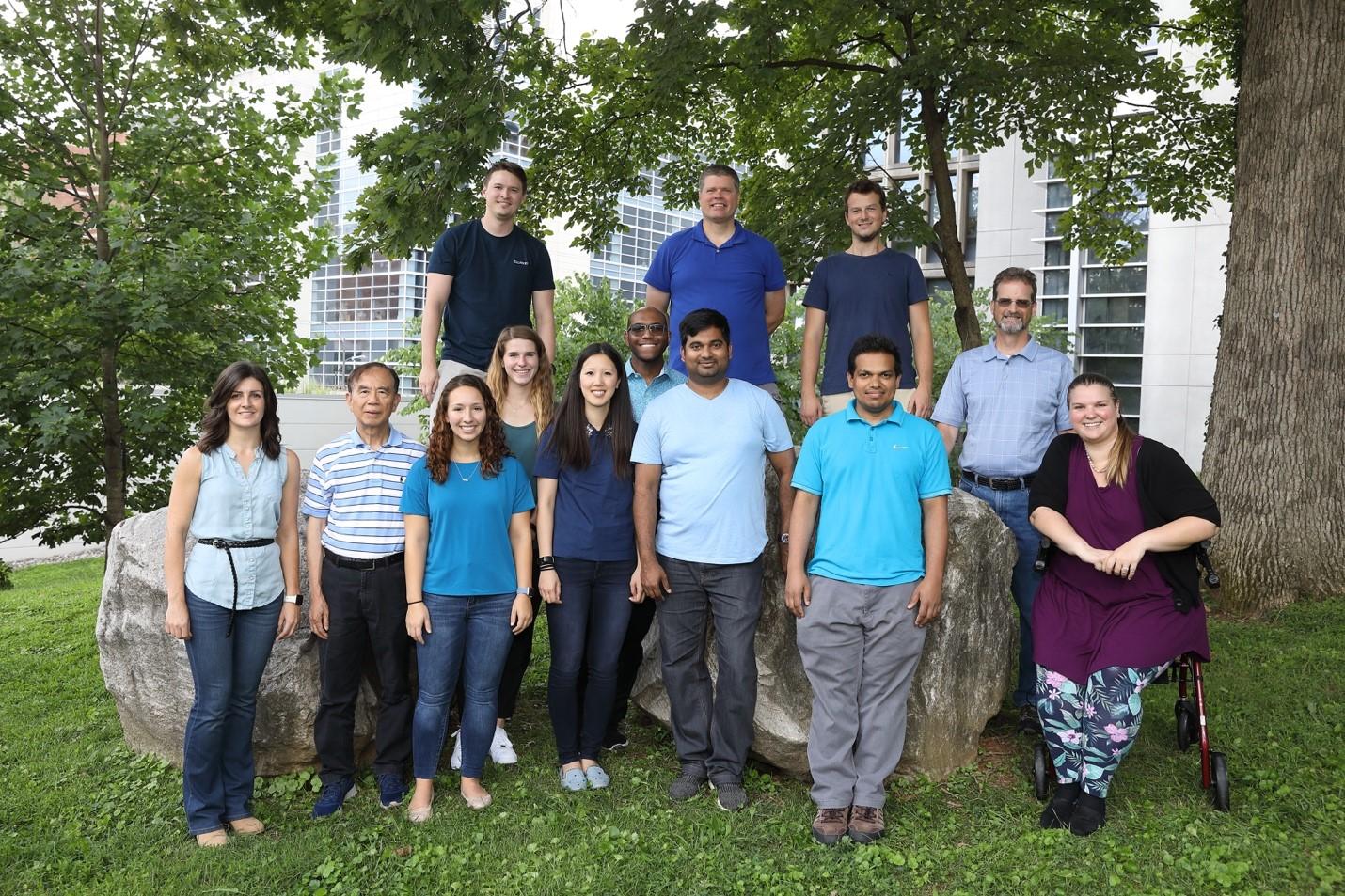
Megan Majocha in the lab
Kent W. Hunter, Ph.D., is a Senior Investigator in the Laboratory of Cancer Biology and Genetics. He studies how inherited traits affect tumor behavior in breast cancer. In particular, he wants to know why some people develop metastatic disease and others do not — with a goal of bolstering precision medicine for breast cancer prevention and treatment. Along with, and in support of, his breast cancer research, Dr. Hunter leads the Deaf Student Training Program (DSTP). This program enables deaf and hard-of-hearing college students and recent graduates to train in modern biomedical research methods. In honor of National Disability Employment Awareness Month, we asked Aashni Kamra, Megan Majocha, and Emmanuel Perrodin-Njoku, DSTP participants from Dr. Hunter’s research group, about their experiences in the program.
Aashni Kamra is a postbaccalaureate fellow who studies how the nucleolus responds to stress in breast cancer cell lines with and without the Sipa1 protein. Megan Majocha is a predoctoral fellow in the Georgetown-NIH Graduate Partnership Program. Her work focuses on identifying and characterizing Shc1 as a potential metastasis-susceptibility gene in breast cancer. Emmanuel Perrodin-Njoku is a postbaccalaureate fellow who studies how recurrent mutations in murine CTNNB1 (beta-catenin) contribute to the dissemination and colonization of breast cancer cells in the lung.
How would you describe your experience in the DSTP?
Aashni Kamra (AK): My experience in the DSTP has been amazing. Accessibility in the lab has been unparalleled, with interpreters available constantly and lab members who do their best to be inclusive. Our mentors truly care and make sure we are in an environment that is conducive to learning.
Megan Majocha (MM): I had the most rewarding experience in this program while I was a postbaccalaureate fellow. I received accommodations, such as qualified American Sign Language (ASL) interpreters, and mentors who were willing to learn ASL. When I applied to the Georgetown-NIH Graduate Partnership Program, I chose the Hunter Lab to do my thesis research, in part, for the guaranteed accommodations and a lab that is aware of Deaf culture.
Emmanuel Perrodin-Njoku (EPN): My experience has been very educational and illuminating. Being able to learn how biomedical research is done in such an accessible and supportive laboratory environment, with fellow deaf and hard-of-hearing postbaccalaureate fellows and lab mates who learned ASL to better communicate, has been a very positive experience.
How has your time at CCR impacted your career goals?
AK: It’s helped me confirm that I have an interest in women’s health and would like to work in the clinical side. Everyone at CCR works hard to create a collaborative environment while constantly sharing information and learning from each other. I hope to be part of such a supportive environment again in the future.
MM: While I enjoy doing cancer research, my time at CCR made me realize the importance of science communication. As a part of my career goals, I aim to make science accessible for all, including deaf individuals.
EPN: My time at CCR has helped me see how you can use a medical degree to pursue research that improves the quality of life and health outcomes of patients. I hope to do the same with the knowledge that I have gained in my time here.
What is the best training advice you ever received?
AK: Doing science means making mistakes and learning from your failures. For all the times I’ve failed at something or made a mistake, time and time again my mentors have taken it with a smile and said, “That’s OK. That’s how you learn.” And I have!
MM: It is not about the number of hours you work in the lab that makes you a successful and productive researcher. It is about knowing your resources and working smarter.
EPN: Improve productivity by being SMART — Specific, Measurable, Attainable, Relevant, and Timed — when planning schedules and setting goals. But just as critical, take time for yourself when needed, and balance work with self-care.
What would you tell prospective CCR fellows?
AK: The CCR is filled with world-class experts. There is a breadth of knowledge available at your fingertips, and even though it may be overwhelming, take advantage of your time here to learn and absorb as much as you can!
MM: Grab every opportunity you are given, but remember to prioritize your courses, lab work and life. Also, keep in mind that the lab environment and student-mentor interaction are very important.
EPN: I would encourage prospective CCR fellows to be willing to learn. The saying “you get out of life what you put into it” holds true here. Take the time to develop yourself not only as a professional scientist, but also as a person. The CCR has given me an opportunity to grow, and I hope that prospective fellows will get the chance to experience the benefits this organization can impart.
Dr. Hunter offers his thoughts as a cancer researcher and disability ally.
Image credit: Photo from 2019, courtesy of Dr. Hunter
Cancer is such a difficult problem to deal with. As a result, we need as many bright and dedicated scientists as possible to try to tackle the problems. Everyone who can contribute should be able to contribute to our efforts to try to control these diseases. Programs like the DSTP help by encouraging and training highly capable individuals who might otherwise not have the opportunity to contribute to the cancer research effort.
Editor's note:
The text of this article has been edited to reflect Dr. Hunter's current title.
